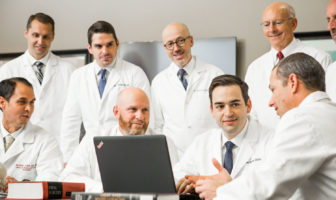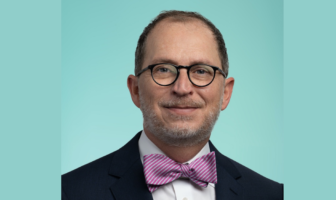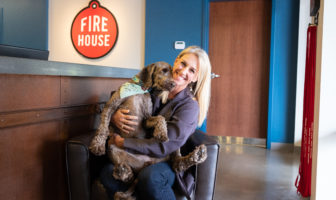Dell Med is addressing the lack of equity in health care, striving for everyone to have equal opportunity to be as healthy as they can be.
By Anna Lassmann

Dr. Jewel Mullen joined Dell Medical School last September as the associate dean of health equity, a new role designed to bring an intersectional approach to health care. Mullen also serves as an associate professor in the school’s departments of population health and internal medicine.
Austin Woman sat down with Mullen to discuss her role in addressing health equity in Travis County and beyond.

Austin Woman: How do you define health equity?
Jewel Mullen: I’ve observed that people don’t work with a single definition. … Health equity is two different words, so I think about health and I think about equity. In general, as a doctor and as a public-health professional, when I think about health, I’m considering what it takes for people to be as well as they can be, as healthy as they can be—mind, body, spirit—in a holistic way. And equity is a term that relates to everybody. Everybody’s having the chance to be as healthy as they can be.
AW: How have your past experiences prepared you for this role?
JM: I grew up in a nice, lovely suburb of New York City that was very diverse: It was racially and ethnically diverse. It was religiously diverse. It was demographically diverse. So, I never learned to assign privilege or poverty to somebody based on what they looked like, the color of their skin, their religion. So, I saw people who were doing well or not doing well that fell into many different categories, and that included people with physical and cognitive disabilities. … And that also reinforced for me that some people need more help than others…and the closest, up-close example I had of that as a little kid was just growing up with one of my best friends having sickle cell anemia and being in and out of the hospital a lot. Now, I had a lot of illnesses too, but they were the more common childhood illnesses you got before the days of lots of vaccinations, so I always got better, and we had private doctors. But my friend with sickle cell anemia didn’t have private doctors; she went to clinics; she would go to the hospital. … At one point, she went to the hospital and then one day, my mother had told me she had died. What I didn’t know then and what I wondered about even at the age of 10 or 11 was how could that be because I always got better and I knew I had this level of care that she didn’t have and I just had a sense then that “Wow, how could it be that I had such an opportunity to be better?”
AW: How has your role allowed you to address health equity so far?
JM: One of the things I love about my role is that when the dean created this position, I took it as the invitation to come here and bring leadership that would get all of us who work in different parts of Dell Med to talk about these issues and then to develop our shared understanding of what health equity is. … To even have those conversations about how we in Dell Med create those opportunities and the ways in which we teach students…students come here wanting to ensure equity for people in Austin, Travis County, Central Texas and beyond. So, I get to participate in their learning towards that and participate in the way we put systems together to take care of patients…and the ways in which we become partners with people in the community who have known about the problems in Austin and Travis County long before the Dell Med house landed here.
AW: What opportunities have you identified to improve health equity in Central Texas?
JM: I like to look at our work from the inside out and the outside in. So, one of the key points for me early on is this inside-out work around how do we communicate? How do we communicate with one another? How do we communicate about equity? How do we communicate with people who are deaf, hard of hearing and of limited English proficiency? … Austin has a very large deaf community, so that’s very important to me that we’re not just talking about bilingual English-Spanish, but we’re thinking about other needs of communication that aren’t just oral. … All of that is a really inside-out service and it’s also a way for us to collaborate across disciplines so we’re being very mindful of an equitable approach to communication. … From the outside in, a lot of my first work has been learning what’s happening here already because I think sometimes one of the mistakes leaders can make is almost projecting that they have the answers before they even know where they are.
When we improve access and quality of health care for people, we’re contributing to being a model healthy city.
AW: How do you hope to address those improvements going forward?
JM: A lot of the work I do is by convening other people who are most directly responsible for certain elements of communication and getting them to sit and talk together, share ideas and also share challenges so that we can do collective problem-solving and strategizing and along the way ensure that we’re getting the input from people who understand and represent the real lives of the people in the communities that we’re serving. … I have [also] been supporting some specific efforts in which I want people to understand that health equity isn’t a project…but an approach that’s informed by shared values in people’s opportunity to be well. … We can then show where I and others at Dell Med have contributed to efforts to make Austin a model healthy city. The mayor has some work that he’s been doing; he’s created a task force on institutional racism and systemic inequity. … [And] as somebody who’s a supporter of the Austin/Travis County Public Health Department, where I can amplify messages or lend expertise, I do, and part of what I bring to co-chairing that task force’s health-and-wellness work group this year is a reminder that when we address health equity, we’re trying to make things better for everyone.
AW: What would it take for Austin to be a “model healthy city?”
JM: I’m just contributing to that; it’s part of Dell Med’s [mission]. For people to be able to be as healthy as they can be…we understand when we do work to improve housing affordability, that ultimately, that impacts people’s health and well-being; that when we improve behavioral health care for children, adults and families, that contributes to a model healthy city; that when we support improving education outcomes…those things contribute to being a model healthy city because they also strengthen the regional economy, and we can’t really think we have a strong regional economy if we have a lot of people falling off a cliff in that economy; that when we improve access and quality of health care for people, we’re contributing to being a model healthy city. When we make sure people aren’t socially isolated or are unable to get to work because of inadequate transportation, we’re creating a model healthy city. When we pay as much attention to the needs of older adults as to the needs of children and youth…then we’re taking a life-course approach where we’re also making sure we’re caring for the entire spectrum of our humanity, [and that] contributes to being a model healthy city. Where we move to a point where we have conversations where people can feel comfortable or comfortably uncomfortable talking about issues around race and gender and sexual orientation and things like the economy and words like “equity” so we can work together on everyone’s behalf, we’ll be making a much bigger step to being a model health city.
AW: Why should people be knowledgeable about health equity?
JM: I think I will always walk on this earth believing that we are here to be as good to and for one another as we ought to be, and it’s harder for that to happen from a sense of opportunity for all when so many people feel like they’re being left out. As soon as somebody gets to this notion of “Life isn’t fair,” then it gets hard to engage them in a conversation about fairness. So, people ought to know what health equity is so they can see themselves in it because if they can’t also see themselves in it, no matter where they’ve been on the spectrum of opportunity, it’s going to be even harder for them to see somebody else in it. … But that’s why everyone should think about it because everyone has a role in creating it and understanding that in playing that role, I would hope that we would always want to pay attention to people who need more attention, knowing that that’s not to the exclusion of others.



